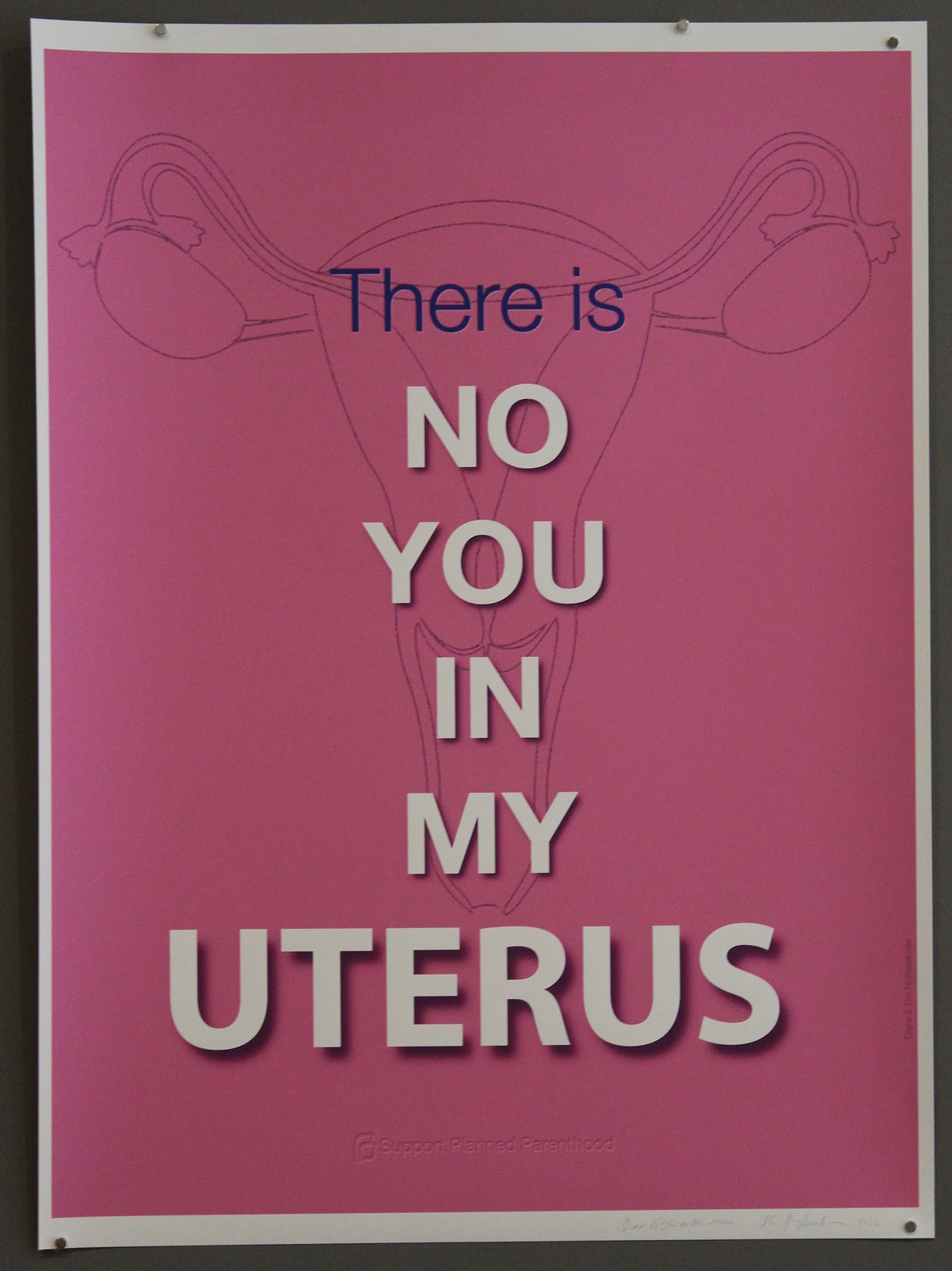
Diane and Tim Nighswander
Uterus.
The poster isn’t trying to be subtle. It’s an expression of protest, and the anger underneath it. That the message is delivered so clearly is a testament to the people who made it — professional visual artists, photographers and graphic designers Diane and Tim Nighswander.
They’re two of many artists who answered when curators Linda Lindroth and Sally Hill called for a show of posters decrying the Supreme Court’s overturning of Roe v. Wade in June, removing the protection of a constitutional right to an abortion and setting off a cascade of legislation in half the states in the United States either severely limiting or prohibiting access to the procedure. In response, other states, including Connecticut, expanded protections.
With the prospect of people traveling to the state from elsewhere to get an abortion, Lindroth’s and Hill’s show — “Undue Burden: Privacy, Protection and Politics” — has the explicit aim of raising money for Planned Parenthood of Southern Connecticut.
“Undue Burden” runs at the Da Silva Gallery in Westville through Oct. 30.
“Posters have played a role in America’s political landscape since 1824 when John Quincy Adams used one to announce his presidency,” the curators write. (One suspects they’re being conservative about that date.) “This exhibition features original poster-sized works on paper, which are each for sale for $250 with all of the proceeds going to Planned Parenthood of Southern New England.” A closing reception will be held at the gallery on Oct. 29 from 3 p.m. to 5 p.m.

Kevin Van Aelst
Dear SCOTUS.
That the politics are so overt isn’t surprising considering the subject matter. The kinds of graphics used by anti-abortion activists can be downright grisly, as has been the case for the posters protestors have brought to the steps of Planned Parenthood on Whitney Avenue over the years, or in the strange case of an unknown artist who first scattered obviously fake dollar bills around the state, with a URL printed on it that, on a certain date, led people to a video of actual abortions. In that context, the posters are comparatively tasteful, if occasionally edgy.
George Corsillo, of Design Monsters, has created a poster entitled “2nd Amendment Firing Range,” which has the faces of a certain former president and Supreme Court arrayed on a bullseye. “You’re hired!” says Trump in the middle. “Fire them all!” says an instruction on the bottom. Its circus-like theming clarifies that it’s intended as sarcasm. Scott Schuldt’s poster pokes fun at Samuel Alito by dressing him in a bad Puritan outfit. “Finding Legal Precedent: An Evening of Discussion with Samuel A. Alito,” the poster is titled. “Topics include: legal ramifications of prehistoric cave paintings; I’m not a real jurist. I just play one in court;” and “Discussion? Where’d you get that idea?” Alex Girard’s poster declares a single point: “Why are males speaking to a decision they will never face?” Kevin Van Aelst’s image, meanwhile, gets the point across in a single gesture.

Beth Klingher
Not Again.
Other posters take a longer view. A second poster from the Nighswanders evokes the famous line from Leonard Cohen — “There’s a crack in everything / That’s how the light gets in” — to gather strength for what’s ahead. Colleen Coleman’s poster reaches back to Frances Ellen Watkins Harper, a famous 19th century poet, author, lecturer, abolitiionist, suffragist, and reformer, to point out that political work is a long haul, longer than a lifetime. Jeanne Criscola’s poster is born of the moment she recently learned that Estelle Griswold, of Griswold v. Connecticut — which extended constitutional rights to buy and use contraception without government interference — lived in a brownstone on Trumbull Street. Sheila Levrant de Bretteville’s contribution is a reprint of a vintage poster from 1974 about women’s rights, showing that for all the change, the struggle is in many ways the same.
Other artists make the political personal. Martha Lewis’s sardonic take on the famous Botticelli painting The Birth of Venus, dissecting and labeling the subject like a specimen, is captioned with the statement “so much interest in what we grow, and how or when, or if we grow it … so little regard for us.” Brenda Zlamany’s poster, a nude of her pregnant sister Christina, highlights the power of motherhood amid the freedom to choose. Meanwhile, Beth Klingher’s poster, of a mosaic she created, captures some of the rage and despair many felt at the moment the ruling was handed down, at the sense of a right previously given now taken away, for the first time since a Supreme Court decision took away voting rights for Black people in 1876.

In the middle of all this, Ruby Gonzalez Hernandez’s poster serves as a conclusion, a note of steely optimism. The overall image is of a dock on a hazy shore, conveying a feeling of embarking on a voyage into the unknown. The text, however, is a rallying cry, printed over and over, like a chant. “Collective power is scary to them because it is real,” says one statement. “It must be real to you too. It is real to the people who have claimed power over your body in Congress. It is real to every person who has ever disrespected your body. Because they know they’re wrong.” Hernandez’s bruised hope is emblematic of the show. Unapologetically partisan, pointed and personal, it creates community in resistance.
“Undue Burden: Privacy, Protection and Politics” runs at the Da Silva Gallery, 897 – 899 Whalley Ave., through Oct. 30. Visit the gallery’s website for hours and more information.






....and there should also be no YOU in the taxpayer pocket to pay for Medicaid abortions... you want to kill the fetus? Pay for it yourself.